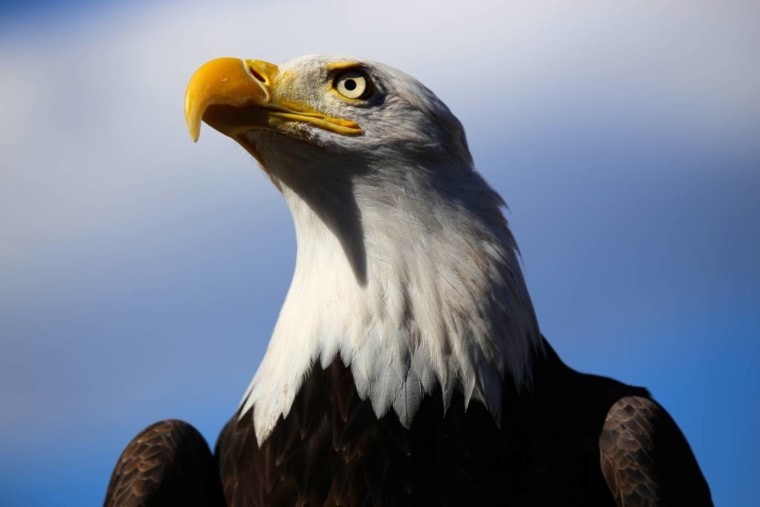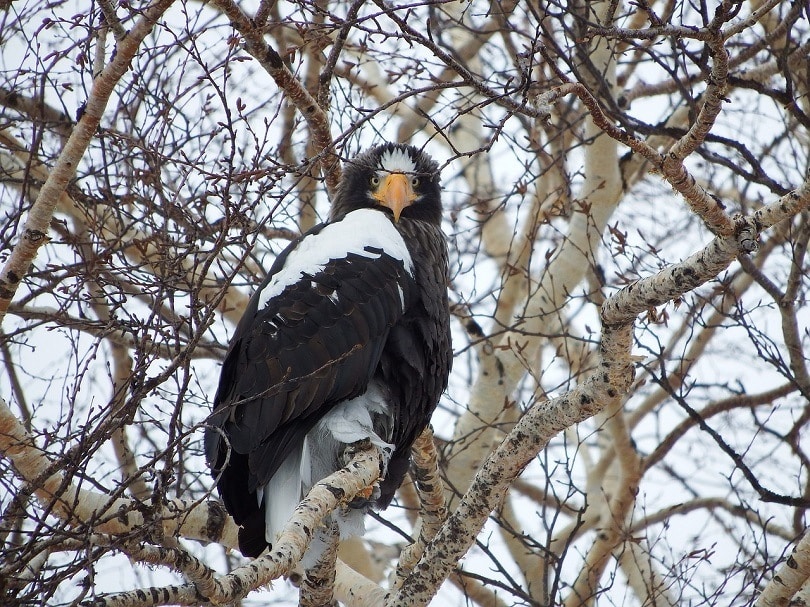
Eagles are large birds of prey. They have hooked beaks that are designed for tearing through flesh, and they are muscular birds that are bigger than most other raptors, except vultures.
Depending on the species of eagle, and where they reside, their diet consists of mammals, birds, and some fish. They fly at 30 mph, achieving swopping speeds of 100 mph when diving for prey, with the Golden Eagle reaching speeds as high as 150 mph. They are magnificent creatures but, despite their size, few of us have the opportunity to see them in the wild.
Only two species of Eagle are indigenous to the USA: the Bald Eagle and the Golden Eagle, although two other species do visit and can be found on US shores: the Steller’s Sea Eagle and the White-tailed Eagle.
In all cases, it is illegal to keep eagles as pets, and the only way that a person can tame and keep eagles is if they have trained and certified as a master falconer.
Disclaimer: Pet Keen does not endorse or encourage the keeping of wild, exotic, protected, endangered, or otherwise threatened animals as pets. This article is for informative purposes only.
 Why Can You Not Keep Eagles As Pets?
Why Can You Not Keep Eagles As Pets?
There are US laws that protect eagles and ensure their wellbeing are very strict. Even taking an eagle feather that you find on the ground is an offense, according to the Bald and Golden Eagle Protection Act of 1940. There are exceptions, but only for recognized American Indian tribes, and even then, the rules are precise and must be strictly adhered to. The unlawful possession of an eagle feather can carry a $5,000 fine or one year in prison even for a first offense.
The same act also makes it an offense to keep an eagle as a pet although there are exceptions that allow a master falconer to apply to be allowed to keep one or more of these wild birds.

How to Become a Master Falconer
Becoming a master falconer is not a simple task.
Typically, you must start as an apprentice, working with a recognized sponsor, for two years. The apprentice must build a hawk house. Other necessary equipment includes a scale and perch, leash and swivel, glove, bells, and a food source.
With 2 years of experience, an apprentice becomes a general falconer and is permitted to keep two raptors, typically red-tailed hawks or kestrals. A further 5 years of experience will lead to the designation of master falconer.
Even once a person becomes a recognized master falconer, they must apply for an eagle license. Since 2008, it has been possible to apply for a license at state level. Once you have an eagle permit, you are allowed to keep up to three golden, white-tailed, or Steller’s sea eagles. The keeping of Bald Eagles is prohibited, no matter how experienced a falconer you become.
How to Enjoy Eagles
Although you can’t keep eagles, in most cases, there are still ways that you can enjoy these incredible animals. The best way is to see them in their natural surroundings.
Alaska has the largest population of Bald Eagles in the US with more than 30,000 birds. However, they can now be found in all states apart from Hawaii. The species got the name not because it is bald but because its white head, in contrast to its dark brown body, makes it looks as though it has a bald head. This also makes recognition easy. They tend to be active at around 8am and 5pm. They like lakes and are most often spotted high in trees surrounding large bodies of water. Although they do prefer fish, they will eat small animals including birds and rodents so they may be seen hunting in open fields.
Golden eagles are dark brown and have the same color head as their body. They are usually found over open ground and may be found in mountains as well as over hills and cliffs. Although rare in the Eastern states, they are more common in the West.

Alternatives That You Can Keep
Keeping native owls also requires that you are a licensed falconer, although you do not need to be a master falconer in most cases. However, in states that do not specifically prohibit the keeping of non-native owls, it is legal for you to own and keep one. The Eurasian eagle owl is one of the largest and most common examples of owl that can be kept in some states, without a license or permit.
However, you need to consider whether you should keep an owl as a pet. Owls need a large outdoor enclosure, unlike similarly sized parrots that can live happily in an indoor cage. They will never be pets, in that they will not enjoy being cuddled and may only barely tolerate being handled after years of ownership. They are very high maintenance, requiring daily care, and this also means that they require a considerable commitment that can make holidaying impossible. They are also nocturnal and this means that they are prone to making loud noises at night, preventing you and your neighbors from getting good rest.
Parrots, on the other hand, are considered good pets. If you choose the right species, they can be playful, enjoy human company, and although they do require regular maintenance, it is easier to find a friend or family member that is capable of providing short-term care while you have a week or two away. Budgies, which are among the smaller pet parrot species, are not only playful and friendly but are relatively easy to keep, do not destroy your house, and they tend to be quiet birds.
 Do Eagles Make Great Pets?
Do Eagles Make Great Pets?
Eagles are wild birds. Only master falconers can own an eagle. Even if you undertake the 8 years of training required to become a master falconer, eagles do not enjoy handling and will never be considered a domesticated animal. They need a lot of outdoor space, require regular flying and exercise, and they must be kept according to strict guidelines. Consider spotting and observing eagles in the wild, instead, or taking on a more manageable and practical bird like a parrot or other indoor bird.
Feature Image Credit: Steve Boise, Shutterstock

 Why Can You Not Keep Eagles As Pets?
Why Can You Not Keep Eagles As Pets?





